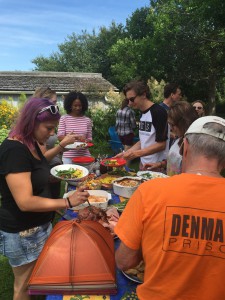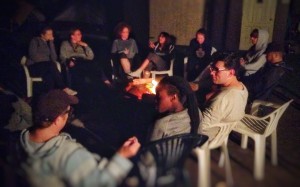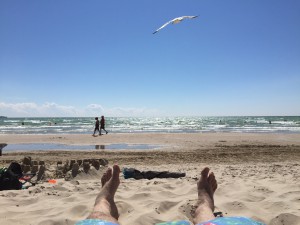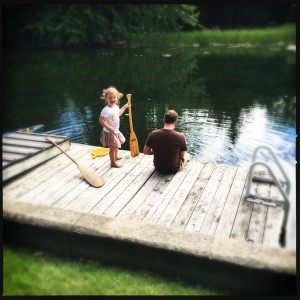Tales of tour survival from actor Steven Burley….
Listen. I will tell you how we survive. I’ve done it for many years.
But, first: It’s windy in Peterborough. It’s the kind of wind that comes on strong, then suddenly dies, and in that moment of calm, before the next push, it’s like the trees whisper ‘holy foof’. We are on a hilltop next to our intended playing space. Many of the actors are hoisting iPhones to the heavens, as if refracting the sky through the lenses of their mini-cams will stave off our obvious doom. The cloudbank skimming towards us looks like an ink stain on Zeus’s palimpsest, or, simply, less pretentiously, an alien mothership. An invader from that awful Will Smith movie. I look around for Will Smith. He is nowhere to be found.

There will be no show tonight, the heavens are saying. No matter how electrifying your performances, or handsome your veteran actors. Regardless of the hours of labour it took for the crew to build your stage and hoist your lights and run your miles of cable. Also: nuts to the legions of patrons that usually flock (in the hundreds!) to this particular venue. Forget your 100% rain-or-shine guarantee, the heavens say. I am coming to kill you.
But I paraphrase.
Weather is one of the obvious, and most unforgiving, forces we fight when we tour.
But, then, truly—it has always been thus. Even when we didn’t really tour.
And there’s the rub!
Driftwood Theatre Group, today, is known as a touring company. In fact, it is one of the only touring theatre companies left in Ontario. (Cue: wood-knocking.) But in 1995, the year of its inception, Driftwood performed only 8 shows at 4 venues—Oshawa, Whitby, Bowmanville, and Port Perry. (More a weekly excursion than a tour.) Now, Driftwood travels to nearly thirty venues—between London in the west, St. Catharines in the south, Bobcaygeon in the north, and Kingston in the east.
So, here I am—twenty-one years from outbreak—nestled in a coffee shop in downtown Kingston, a few hours before show time, strewing my pearls of wisdom pell-mell about the blogosphere. To tell you about touring. And, most importantly: How. We. Survive.
Ominous, right? Bet you can’t stop scrolling now, can you? (Here’s a cute picture, just in case you can.)

First, a few logistical clarifications. We have a company van. We have a company bus. I drive the bus. It’s a sweet, sweet ride. Tricked out for both style (sexy art/logo on its sleek, forest-green exterior) and function (it houses costumes, concessions, and about 8 company members avec duffels. Also, the ‘Bard’s Bus’—hence, the tour moniker—when parked on site, becomes a change room. A ladies change room. Again, classy.
Now, an admission: I have a wee bit of road rage. It’s gotten milder with age, and is frequently quelled by the stuffed toy kitten in my cup holder. This is my Thera-Pussy. When the microcosm of social decay that is bad driving begins to rile me, TP takes it upon herself to screech at the offending motorists. It keeps me focused on my task, which is good driving. A survival tool not as much for me, but for people who can’t drive properly.
Over the years, we have endured both the grind of GTA traffic, and the miles between Orono and Lindsay with nary a Tim’s in site. Tips for survival here include: good confab, a compilation disc of reggae, the proper connecting cable to antiquated dashboards, so as to play your new-fangled devices, song circles, the latest Governor-General Award-winning novel, nap time, and Candy Crush. (This is in NO WAY a promotion for that application/game. It’s diabolical.)
Another way we survive the tour: CUTE TOWNS. Oh, my. Ontario is rife with them.
Many of our shows land in such unapologetically beautiful places as Westport, Bloomfield, and Port Perry. Places near water. Places with family-run coffee shops. Places with stores that go ‘tring-a-ling’ when you walk through the front door. These towns provide us a respite from the road, and the bustle of urbanity.
Which brings me to one of the main reasons I love traveling with Driftwood.
We are currently in that stretch of the tour (usually the second-to-last week), where we get SPOILED. Just spoiled rotten. It begins with The Luncheon. The Luncheon is an annual treat on the lawn of Colin & Kerry Taylor, two of the company’s staunchest supporters. Whether it is philanthropy or sheer madness, these two people host a mid-afternoon party (on their own property, mind) for our band of straggly babies. It is here that you can: eat, drink, swim, compete with stage management for the Bocce ball title, nap in the grass/hammock/bed of kittens, and generally experience a state wayyyy outside of melancholy. This Luncheon tends to take place before the Peterborough show. And when we aren’t rained out (see above), that show tends to hum with clear-eyed contentment. More wisdom: feed an artist, enhance an artform. (THIS PHRASE IS COPYRIGHTED. But spread the word.)

And then the tour heads east through Prince Edward County. Artistic Director, D. Jeremy Smith has a family cottage in Outlet, a fizzy little burp of a place outside Picton. This cottage becomes DTG’s HQ for most of the week, as we tour to outlying areas. And—as many former company members know—the cottage rules. (The ACTUAL cottage rule: DO WHAT YOU WANT. Ridiculous.)
I mention former company members here for a reason. Whether they (a) have moved on to other gigs, (b) are coincidentally homeless that same week, or (c) can’t take the words ‘you are FIRED’ as a reason not to attend, ex-Drifties tend to posse up and ride the tour’s coattails for a few days of DOING WHAT YOU WANT. Which usually includes: campfire karaoke, beach-bumming, wine touring, and all sorts of salad-eating. And, now that some of the company members have grown into adults and spawned progeny, there is an additional bonus: playing with babies. My phantom uterus goes BOOM.




Barbara and Howard Smith, my other parents and Jeremy’s actual parents, host and tolerate us for the week. Their generosity is immense. Another reason we survive the tour.
And now. Here I am. Thinking that there’s actually a boil of sentiment brewing beneath this cheeky survival memo. Penned not by the gristly survivalist I hinted at before, but rather the sap on Driftwood’s tree.
Here:
Survival on tour is ALWAYS an option. Despite the odds against it, when we caravan about twenty people thousands of kilometres through columns of tornadoes, fatigued and hungry and missing home, we always survive. We survive because we all become, and reunite with, family. That’s why I’ve been around all these damn years. Family. Smiles new and old. A growing narrative of people and places.
Plus, the shows we do are good. Real good. So come see us. You have another week.
xo,
Steven

Happy World Theatre Day
/in NewsIn celebration of World Theatre Day, Driftwood Theatre is excited to announce its 2017 season of The Bard’s Bus Tour and supporting projects.
Ahead of the Bard’s Bus Tour, Driftwood presents a reading of Lolita Chakrabarti’s award-winning play, Red Velvet, as part of its Play in a Pub series.
Red Velvet is a fictionalized accounting based on the true story of Ira Aldridge, an African-American actor who achieved an extraordinary career in London and Europe during the nineteenth century. Ira Aldridge, at the age of 26, takes over the title role of Othello from an ailing Edmund Kean as riots build in London’s streets over the abolition of slavery.
Taking on the role of Ira Aldridge for the reading is celebrated Canadian actor, playwright and director Andrew Moodie.
Play in a Pub: Red Velvet by Lolita Chakrabarti will take place on Monday, May 15, 2017 at the Social Capital Theatre (154 Danforth Avenue).
Play in a Pub is Driftwood Theatre’s casual reading series of plays inspired by or based on the work of William Shakespeare, over a pint.
For its 23rd annual Bard’s Bus Tour, Driftwood Theatre presents Othello. William Shakespeare’s blistering tale of race, jealousy and revenge is set against the backdrop of Canadian history, when in 1974 Canadian soldiers are caught in a life or death struggle on the small island of Cyprus.
Bringing extraordinary presence to the title role is emerging artist Jordin Hall (Titus Andronicus, Seven Siblings Theatre; A Midsummer Night’s Dream, Humber River Shakespeare; The Changeling, Shakespeare BASH’D). Completing the cast of six performers are Shelly Antony (Little Pretty and the Exceptional, Factory Theatre; Disgraced, Magnus Theatre; Scarberia, YPT) as Cassio, Christopher Darroch (eight Driftwood seasons; Gone With The Wind, MTC; A Man of No Importance, Musical Theatre Stage Co.) as Iago, Helen King (A Midsummer Night’s Dream, Much Ado About Nothing, Driftwood) as Brabantio/Bianca/Montano, Ayesha Mansur Gonsalves (Laurier, TNB; The Winter’s Tale, Dauntless City) as Emilia/The Duke, and Fiona Sauder (Peter Pan, Bad Hats Theatre; Taming of the Shrew, Driftwood; The Fighting 61st, Blyth Festival) as Desdemona.
Othello will tour 25 Ontario communities from July 14 – August 13, 2017. The Bard’s Bus Tour is supported by Tour Sponsor, Ontario Power Generation. Toronto performances are generously supported by the Toronto Arts Council Animating Toronto Parks program.
As a special addition to the Bard’s Bus Tour, Driftwood Theatre presents The Cyprus Project , an audio-installation inspired by Fixtpoint Theatre’s Tale of a Town series.
In 1974, a significant incident tore the island of Cyprus apart, enflaming violence, division and war between Greek and Turkish Cypriots which continues to this day. Three Canadian soldiers, serving in Cyprus as part of the United Nations Peacekeeping Force, died during that summer’s conflict and a further 18 were wounded. The Cyprus Project collects the stories surrounding the conflict in order to deepen our understanding of Canada’s role as a peacekeeping nation and the cultural conflict in Cyprus.
The Cyprus Project installation will be a free audio experience prior to all performances of Othello as part of The Bard’s Bus Tour.
The Cyprus Project is supported by The Government of Ontario and Ontario 150, and is presented with the support of FIXTPOINT THEATRE.
Rounding out Driftwood’s summer activity is the Beyond the Bard Playwright Residency. For the first time, Driftwood Theatre will host a resident playwright during its summer season. Emerging Canadian playwright Jesse LaVercombe will work alongside Othello company members for six weeks, developing his play Resurrect, originally created as a site-specific play for Driftwood’s 2017 Trafalgar 24 festival.
The Beyond the Bard residency will culminate in free public readings of Mr. LaVercombe’s work prior to select performances during the Bard’s Bus Tour.
Beyond the Bard is made possible with the support of the RBC Emerging Artists Project.
DRIFTWOOD THEATRE GROUP
Driftwood Theatre is Ontario’s leading outdoor, summer theatre company, on the road with its award-winning Bard’s Bus Tour for nearly 25 years, reaching over 46 communities and 100,000 people across Ontario. We are guided by a vision of accessible, live theatre for everyone in Ontario.
Driftwood Theatre is generously supported by the Ontario Arts Council.
Save
Save
Save
Save
Save
Save
Save
Save
In process: Robert, by Briana Brown
/in NewsBriana Brown is Driftwood s Playwright-in-Residence, and our current Beyond the Castle playwright. Her play “Robert” was the winning script at last year’s Trafalgar 24. Since Then, Briana has been “embedded” with Driftwood working on “Robert” and other ideas.
I tend to carry stories with me for months, or sometimes years, before they first find their way into a draft. I scribble notes in individual notebooks, send emails to myself from my cellphone, and covertly steal scraps of magazine articles from the dentists’ office. I know my characters like they’re family. When I imagine their location, it is with deep nostalgia. I collect all these pieces until slowly the story surfaces. And then I write it. (And rewrite it and rewrite it and rewrite it.)
From the beginning, the process with Driftwood has been the opposite. In the castle (oh I still love writing that), I pulled something from the air and crafted it into a scene within hours. All that existed of these characters and the world they inhabited ended up on the page immediately. I didn’t have time to consider my choices as obsessively as I tend to do. I was consumed with one thing: “how do I create a scene that works?” It was a fantastic exercise, and I hated almost every minute of it, spending much of the night wondering why on earth I had put myself in such a frightening position, and more importantly why had I invited the man I had just started dating to come see it? Then I saw the play – beautifully staged and performed, mere hours after I’d written it. Which is a truly special experience, and one for which I was very grateful.
Through the Beyond the Castle program, and with the support of the Ontario Arts Council, I have been gifted the luxury of space and time to step back and consider what it is I’m interested in exploring through the premise and characters I created in a panic in the middle of the night last February. Crafting what was a beginning into a full play has been a process of pulling the rest of this story from the air, and following the breadcrumbs of what I’d written to lead me where they want to go.
I think my biggest hurdle so far has been trust. (Alongside overcoming the panic that comes with a lack of trust.) Trusting that these characters will continue to reveal themselves, that there is a story, that it is a story worth telling, that it will connect with an audience and that I, as the ever-doubtful writer, am worthy of telling it. It has been challenging and exciting to engage with the act of writing in a new way, and to force myself into a place of trust and commit the pen to page before I feel “ready”.
Now that I have a first draft behind me, the process feels slightly more comfortable, something I’ve embarked on before, with all its questions and possibilities. Our first dramaturgical session felt good. I was glad to discuss the larger questions of the script, and to get a sense that things are resonating, or are beginning to. The meeting provided me with additional avenues to explore, paths to travel down, and questions to consider. And once again I need to trust — that one of those threads will feel “right” and take me where I, and these characters, need to go.
(And it’s a comedy!)
Together again, huh?
/in NewsThe cast reading this extraordinary blend of classical theatre and pop culture is led by Jonathan Goad (Stratford Festival) as Han Solo, Sarah Wilson (Soulpepper Theatre) as Princess Leia, and Mark McGrinder (Studio 180 Theatre) as Luke Skywalker.
Joining them is a star-studded cast including Thom Allison as Lando Calrissian, Michael Hanrahan as Darth Vader, Melissa D’Agostino as R2D2, Christopher Darroch as C3P0, Helen King as Chewbacca, Richard Alan Campbell as Yoda, Karl Ang as Boba Fett, and performing all sound and music using only his voice, Steven Burley. This incredible group of performers is set to take the stage for a reading in support of Driftwood Theatre on October 26 at The Social Capital Theatre in Toronto. Tickets on sale now!
Play in a Pub 2013. Michael Hanrahan’s (far right) Darth Vader puts the choke on Andy Pogson’s Admiral Motti as fellow PIAP readers (clockwise from top left) Sarah Wilson, Joseph Ziegler, Dion Johnstone, Karl Ang and Oliver Dennis play on.
This fall, the epic saga concludeth. In a pub.
Driftwood Theatre’s Play in a Pub returns for a third year to bring to a close the most epic saga ever penned by the illustrious Bard (also known as Ian Doescher)! The stars of the stage come together in a pub very, very nearby for an evening of theatrical and cinematic mash-up of Shakespearean proportions in support of Driftwood Theatre.
Building on the sold-out success of both Play in a Pub: William Shakespeare’s Star Wars and Play in a Pub: William Shakespeare’s The Empire Striketh Back, Driftwood Theatre reunites some of the finest performers of the stage for another epic reading. “I’m just thrilled by the cast we’ve managed to assemble for this reading,” says Artistic Director Jeremy Smith, “its a great blend of familiar faces to the Play in a Pub experience – people who’ve read in previous events like Sarah, Michael, Rick, Helen, Melissa, Chris, Karl and especially Steven Burley, who is a vocal sound effect genius, combined with two new extraordinary talents to Play in a Pub, Mark McGrinder and Thom Allison. It is going to be an extraordinary evening.”
And let us not forget that Play in a Pub is an interactive event! Audience members can get in on the action by participating in the Rebels, Imperials and Droids n’ Creatures Live Auction, and bid on one of three walk-on character tracks – rebels, imperials, or droids n’ creatures. Whether you are an rebel sympathizer, a cold-hearted imperial or a misunderstood droid, there is a role for you to play in the evening’s reading. The Live Auction takes place immediately prior to the reading.
Audience member Steven Harrison takes the stage as a beleaguered Exogorth (look it up), to the delight of the cast, during Play in a Pub: The Empire Striketh Back.
And back just in time for Halloween is Driftwood’s Star Wars Cosplay Competition. In the spirit of the season, we’re inviting guests to attend the event dressed as their favourite Star Wars inspired character. There will be a cash prize for the evening’s best costume.
But the evening’s galactic epic-ness doesn’t end there! Guests can look forward to bidding on some incredible themed baskets at the jawa-worthy Cantina Market Auction. Driftwood Theatre’s board of directors is putting together a fine selection of themed baskets, from Prince Edward County wine, to Craft Brews, to Toronto entertainment packages and the coveted Star Wars Basket – filled with Star Wars paraphernalia and goodies.
Tickets for Play in a Pub: The Jedi Doth Return are now on sale here. Guests have the option of two ticket prices: General Admission for $25 or a special front-of-the-line Jabba’s Palace VIP ticket for $40 including reserved seating, the VIP treatment and some special goodies.
This year’s Play in a Pub will take place at the Social Capital Theatre at 154 Danforth Avenue (2nd floor) in Toronto.
The last two Play in a Pub events sold out – so don’t miss out, order your tickets today! It is going to be an epic finish to Shakespeare’s galaxy-spanning saga.
Surviving the Tour, or: I Love Your Silly Faces
/in NewsTales of tour survival from actor Steven Burley….
Listen. I will tell you how we survive. I’ve done it for many years.
But, first: It’s windy in Peterborough. It’s the kind of wind that comes on strong, then suddenly dies, and in that moment of calm, before the next push, it’s like the trees whisper ‘holy foof’. We are on a hilltop next to our intended playing space. Many of the actors are hoisting iPhones to the heavens, as if refracting the sky through the lenses of their mini-cams will stave off our obvious doom. The cloudbank skimming towards us looks like an ink stain on Zeus’s palimpsest, or, simply, less pretentiously, an alien mothership. An invader from that awful Will Smith movie. I look around for Will Smith. He is nowhere to be found.
There will be no show tonight, the heavens are saying. No matter how electrifying your performances, or handsome your veteran actors. Regardless of the hours of labour it took for the crew to build your stage and hoist your lights and run your miles of cable. Also: nuts to the legions of patrons that usually flock (in the hundreds!) to this particular venue. Forget your 100% rain-or-shine guarantee, the heavens say. I am coming to kill you.
But I paraphrase.
Weather is one of the obvious, and most unforgiving, forces we fight when we tour.
But, then, truly—it has always been thus. Even when we didn’t really tour.
And there’s the rub!
Driftwood Theatre Group, today, is known as a touring company. In fact, it is one of the only touring theatre companies left in Ontario. (Cue: wood-knocking.) But in 1995, the year of its inception, Driftwood performed only 8 shows at 4 venues—Oshawa, Whitby, Bowmanville, and Port Perry. (More a weekly excursion than a tour.) Now, Driftwood travels to nearly thirty venues—between London in the west, St. Catharines in the south, Bobcaygeon in the north, and Kingston in the east.
So, here I am—twenty-one years from outbreak—nestled in a coffee shop in downtown Kingston, a few hours before show time, strewing my pearls of wisdom pell-mell about the blogosphere. To tell you about touring. And, most importantly: How. We. Survive.
Ominous, right? Bet you can’t stop scrolling now, can you? (Here’s a cute picture, just in case you can.)
First, a few logistical clarifications. We have a company van. We have a company bus. I drive the bus. It’s a sweet, sweet ride. Tricked out for both style (sexy art/logo on its sleek, forest-green exterior) and function (it houses costumes, concessions, and about 8 company members avec duffels. Also, the ‘Bard’s Bus’—hence, the tour moniker—when parked on site, becomes a change room. A ladies change room. Again, classy.
Now, an admission: I have a wee bit of road rage. It’s gotten milder with age, and is frequently quelled by the stuffed toy kitten in my cup holder. This is my Thera-Pussy. When the microcosm of social decay that is bad driving begins to rile me, TP takes it upon herself to screech at the offending motorists. It keeps me focused on my task, which is good driving. A survival tool not as much for me, but for people who can’t drive properly.
Over the years, we have endured both the grind of GTA traffic, and the miles between Orono and Lindsay with nary a Tim’s in site. Tips for survival here include: good confab, a compilation disc of reggae, the proper connecting cable to antiquated dashboards, so as to play your new-fangled devices, song circles, the latest Governor-General Award-winning novel, nap time, and Candy Crush. (This is in NO WAY a promotion for that application/game. It’s diabolical.)
Another way we survive the tour: CUTE TOWNS. Oh, my. Ontario is rife with them.
Many of our shows land in such unapologetically beautiful places as Westport, Bloomfield, and Port Perry. Places near water. Places with family-run coffee shops. Places with stores that go ‘tring-a-ling’ when you walk through the front door. These towns provide us a respite from the road, and the bustle of urbanity.
Which brings me to one of the main reasons I love traveling with Driftwood.
We are currently in that stretch of the tour (usually the second-to-last week), where we get SPOILED. Just spoiled rotten. It begins with The Luncheon. The Luncheon is an annual treat on the lawn of Colin & Kerry Taylor, two of the company’s staunchest supporters. Whether it is philanthropy or sheer madness, these two people host a mid-afternoon party (on their own property, mind) for our band of straggly babies. It is here that you can: eat, drink, swim, compete with stage management for the Bocce ball title, nap in the grass/hammock/bed of kittens, and generally experience a state wayyyy outside of melancholy. This Luncheon tends to take place before the Peterborough show. And when we aren’t rained out (see above), that show tends to hum with clear-eyed contentment. More wisdom: feed an artist, enhance an artform. (THIS PHRASE IS COPYRIGHTED. But spread the word.)
And then the tour heads east through Prince Edward County. Artistic Director, D. Jeremy Smith has a family cottage in Outlet, a fizzy little burp of a place outside Picton. This cottage becomes DTG’s HQ for most of the week, as we tour to outlying areas. And—as many former company members know—the cottage rules. (The ACTUAL cottage rule: DO WHAT YOU WANT. Ridiculous.)
I mention former company members here for a reason. Whether they (a) have moved on to other gigs, (b) are coincidentally homeless that same week, or (c) can’t take the words ‘you are FIRED’ as a reason not to attend, ex-Drifties tend to posse up and ride the tour’s coattails for a few days of DOING WHAT YOU WANT. Which usually includes: campfire karaoke, beach-bumming, wine touring, and all sorts of salad-eating. And, now that some of the company members have grown into adults and spawned progeny, there is an additional bonus: playing with babies. My phantom uterus goes BOOM.
Barbara and Howard Smith, my other parents and Jeremy’s actual parents, host and tolerate us for the week. Their generosity is immense. Another reason we survive the tour.
And now. Here I am. Thinking that there’s actually a boil of sentiment brewing beneath this cheeky survival memo. Penned not by the gristly survivalist I hinted at before, but rather the sap on Driftwood’s tree.
Here:
Survival on tour is ALWAYS an option. Despite the odds against it, when we caravan about twenty people thousands of kilometres through columns of tornadoes, fatigued and hungry and missing home, we always survive. We survive because we all become, and reunite with, family. That’s why I’ve been around all these damn years. Family. Smiles new and old. A growing narrative of people and places.
Plus, the shows we do are good. Real good. So come see us. You have another week.
xo,
Steven